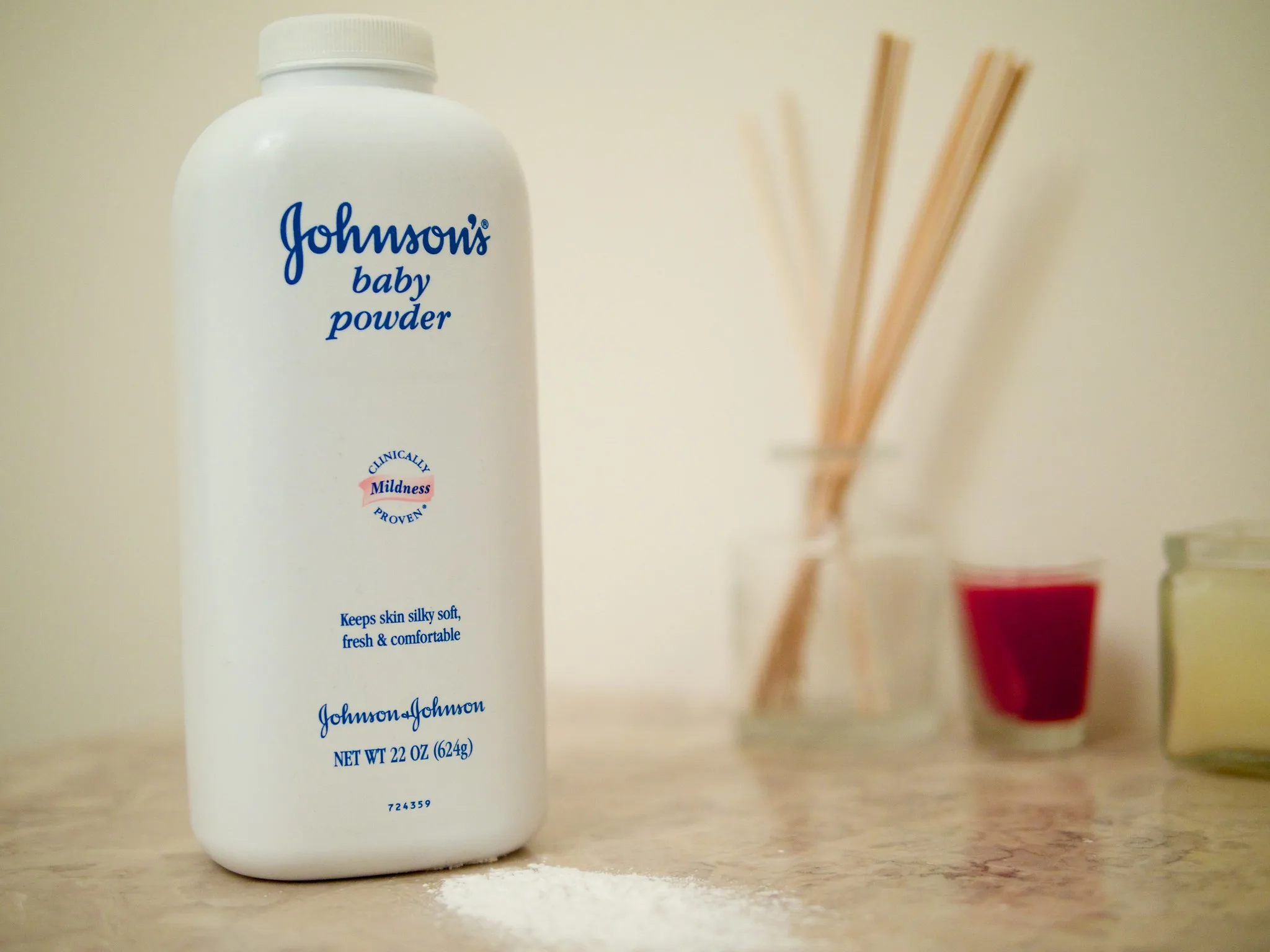Last week Tuesday, Johnson & Johnson announced that they had agreed to pay an $8.9 billion settlement towards thousands of people who claimed that the company’s talcum powder products had caused cancer and mesothelioma.
The proposed settlement, which will be paid out over 25 years and through a subsidiary, comes years after the first filing that claimed Johnson & Johnson products were causing cancer. In lieu of initial court filings and a subsequent news frenzy, the company withdrew talc-based baby powder from shelves in 2020.
Does Johnson & Johnson Baby Powder Cause Cancer?
In 1997, a lawsuit alleged that Johnson & Johnson baby powder contained the cancer-causing compound, asbestos. Since then, there have been thousands of similar lawsuits claiming that the products not only contained asbestos but that Johnson & Johnson was well aware of this fact, per a Reuters investigation.
Asbestos is found in rocks and soil and has been linked to causing cancer in and around the lungs when inhaled, per the American Cancer Society. Now you may think, if that’s the case, why would Johnson & Johnson have it as an ingredient in their products? Well, they don’t.
Instead, they have talcum powder, which is made from mineral talc. Talc is made up of magnesium, silicon, and oxygen. However, in its natural form, talc can contain asbestos.
A small timeline
In 1983, Harvard researchers found that women who used talcum powder faced a two-fold risk of ovarian cancer. As more research came out indicating the potential link between talcum powder and various cancers, Johnson & Johnson continued to introduce talcum powder products into the market. Yet, in 1993, the U.S. National Toxicology Program determined that talc was indeed a carcinogen.
While Johnson & Johnson was encouraged to withdraw talc products from the market, or at least publish warnings on their labels about the potential ovarian cancer risk, the company opted to do neither.
Research over the years has either proven or disproven a definite link between talcum powder and ovarian cancer.
What do the studies say?
It is important to note that the definitive link between talcum powder and ovarian cancer has not been proven. In a study examining this particular association, researchers did not find a significantly increased risk of ovarian cancer. However, they did notice that the risk was heightened amongst certain women who used the products.
These women included those who had never had a hysterectomy or had their tubes tied. Compared to women who have never used the products, these women faced a 13% increased risk of developing ovarian cancer. This rate rose to 19% among those who used baby powder at least once a week.
While the conflicting research is concerning, in February 2016, Johnson & Johnson was ordered to pay $72 million to the family of a woman who had died from ovarian cancer. Her death has been linked to her use of the company’s talc-based Baby Powder and Shower to Shower for several decades. Two years after this, the company paid $4.7 billion in damages to 22 women who alleged the talcum powder caused their ovarian cancer.
What about lung cancer?
Mesothelioma is an aggressive form of cancer that affects the lining of the lungs, abdomen, or heart. According to experts, asbestos exposure accounts for up to 80 percent of all mesothelioma cases.
According to a 2019 study published in the Journal of Occupational and Environmental Medicine, exposure to talcum powder may cause mesothelioma. The study featured 33, mostly female, participants, who had malignant mesothelioma. Per the findings, their only too much exposure to asbestos was through the use of talcum powder. In fact, per further testing, tissue results showed fibers that were consistent with the type of asbestos found in cosmetic talc.
Following the study’s publication, Johnson & Johnson released a statement to TIME reiterating that their baby powder was safe and did not contain asbestos or cause cancer. Referring to the study, Johnson & Johnson pointed out that study co-author Jacqueline Moline had served as a paid witness in asbestos lawsuits and in the study drew on cases referred to her by plaintiffs’ attorneys.
Is the settlement an admission of guilt?
No, the company said the settlement plan was not an admission of wrongdoing. Rather, it was about how the plaintiffs’ claims would have taken decades and been expensive to resolve.
It should be noted that in 2020, Johnson and Johnson announced that they would discontinue sales of its talc-based baby powder in the United States. They also plan to stop global product sales this year, opting to use a cornstarch version instead.
Consumers should be aware
The Johnson and Johnson court case has placed a much-needed spotlight on the products that we use on our bodies. It’s also started the conversation about the responsibility that brands have to their consumer’s health. The recent settlement may have opened the door to allowing more people to come forward. They are now encouraged to hold companies responsible if they’ve played a detrimental role in their health and well-being.
“This settlement is a testament to the tens of thousands of women who have battled both cancer and the court system to achieve justice for themselves. These strong women have ensured that no other woman will be exposed to this unnecessary danger. They deserve compensation and closure.”– Alicia O’Neill, plaintiff’s attorney.



